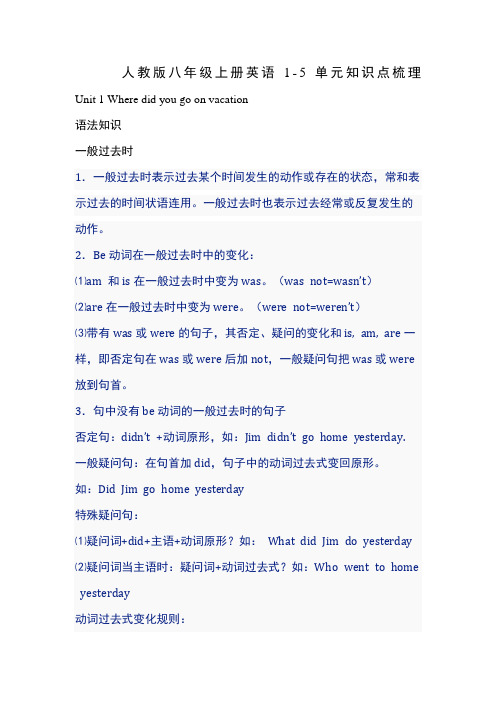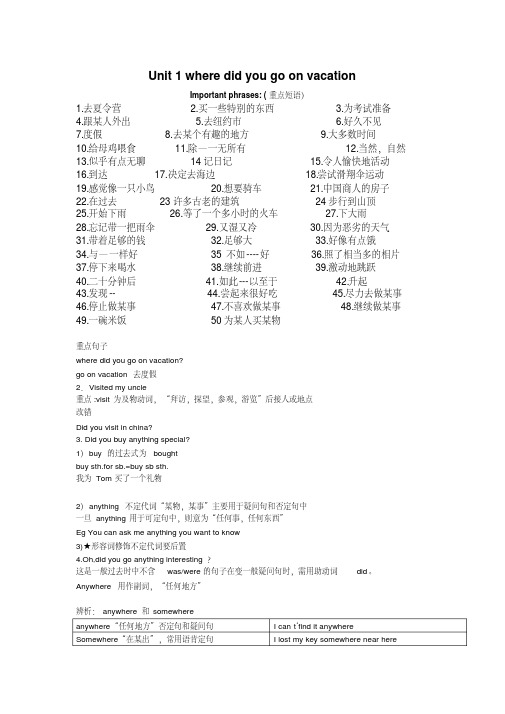八年级上册Unit1-动词过去式
- 格式:doc
- 大小:15.00 KB
- 文档页数:2


一般过去时的概念及用法一、基本概念一般过去时(simple past tense)表示过去某个时间里发生的非持续性动作或存在的状态,也表示经常或反复发生的动作。
用动词的过去式表示,常和表示过去的时间状语连用,如:yesterday,last night,in 1990,two days ago,before,the age of等。
一般过去时也表示过去经常或反复发生的动作,常和often,always等表示频率的时间状语连用。
表示过去习惯性、经常性的动作、行为;过去主语所具备的能力和性格。
二、动词变化1.直接加ed: work—— worked look——looked2.以不发音e结尾的单词,直接加d: live ——lived hope——hoped use——used 3.以辅音字母+y结尾的,变y为i加ed: study——studied carry——carried worry——worried4.以一个辅音字母结尾的,双写最后的辅音字母+ed: stop——stopped plan——planned重读闭音节体现形式为辅-元-辅结构,例如nod, n为辅音,o为元音,d为辅音。
5. 以ic结尾的动词,要把ic变成ick再加ed,如picnic→picnicked,traffic→trafficked 6.不规则变化的动词过去式:have---had are---were get---got say---said feel---felt do/does---did is---was go---went drink--drank eat--ate bring----brought think----thought buy----bought catch---- caught teach ---- taught sit----sat wear----wore cut----cut sweep----sweptsleep——slept see----saw become----became read——read7.以辅元辅结尾的加d三、用法(1)一般过去时表示在过去某个特定时间发生,也可以表示过去习惯性、经常性的动作。

人教版八年级上册英语1-5单元知识点梳理Unit 1 Where did you go on vacation语法知识一般过去时1.一般过去时表示过去某个时间发生的动作或存在的状态,常和表示过去的时间状语连用。
一般过去时也表示过去经常或反复发生的动作。
2.Be动词在一般过去时中的变化:⑴am 和is在一般过去时中变为was。
(was not=wasn’t)⑵are在一般过去时中变为were。
(were not=weren’t)⑶带有was或were的句子,其否定、疑问的变化和is, am, are一样,即否定句在was或were后加not,一般疑问句把was或were 放到句首。
3.句中没有be动词的一般过去时的句子否定句:didn’t +动词原形,如:Jim didn’t go home yesterday.一般疑问句:在句首加did,句子中的动词过去式变回原形。
如:Did Jim go home yesterday特殊疑问句:⑴疑问词+did+主语+动词原形?如:What did Jim do yesterday⑵疑问词当主语时:疑问词+动词过去式?如:Who went to home yesterday动词过去式变化规则:1.一般在动词末尾加-ed,如:pull-pulled, cook-cooked2.结尾是e加d,如:taste-tasted3.末尾只有一个元音字母和一个辅音字母的重读闭音节,应双写末尾的辅音字母,再加-ed,如:stop-stopped4.以“辅音字母+y”结尾的,变y为i,再加-ed,如:study-studied 5.不规则动词过去式:参照P142-P143二.复合不定代词的使用复合不定代词是由some-,any-,no-,every-加上-one,-body,-thing等所组成的不定代词。
复合不定代词包括something, somebody, someone, anything, anybody, anyone, nothing, nobody, no one, everything, everybody, everyone 等十二个。

八上英语unit1语法归纳
八上英语Unit 1的语法归纳包括以下几个方面:
1. 一般现在时:用于表达经常性的动作或事实。
- 陈述句:主语 + 动词原形(第三人称单数加-s)
- 疑问句:助动词do/does + 主语 + 动词原形?
- 否定句:主语 + 助动词do/does + not + 动词原形
2. 现在进行时:用于表达当前正在发生的动作。
- 陈述句:主语 + be(am/is/are) + 动词-ing形式
- 疑问句:Be(am/is/are) + 主语 + 动词-ing形式?
- 否定句:主语 + be(am/is/are) + not + 动词-ing形式
3. 一般过去时:用于表达过去发生的动作或事件。
- 陈述句:主语 + 动词过去式(一般过去式用动词原型加-ed) - 疑问句:助动词did + 主语 + 动词原形?
- 否定句:主语 + did not + 动词原形(一般过去式)
4. 一般将来时:用于表达将来发生的动作或计划。
- 陈述句:主语 + will + 动词原形
- 疑问句:Will + 主语 + 动词原形?
- 否定句:主语 + will not + 动词原形
5. 祈使句:用于表达命令、请求、建议等。
- 陈述句:动词原形
- 否定句:Do not + 动词原形
6. There be句型:表示存在或出现的情况。
- 陈述句:There is/are + 名词 + 其他
- 疑问句:Is/Are there + 名词 + 其他?
- 否定句:There is/are not + 名词 + 其他
以上是八上英语Unit 1的语法归纳,希望对你有帮助。

Unit1词汇讲义拓展make英 [meɪk]美 [mek]第三人称单数:makes现在分词:making过去分词:made过去式:made make 基本解释及物动词做,制造; 生产,制定; 使成为; 使产生不及物动词开始; 尝试; 行进; 增大名词制造; 生产量; 性格; 形状,样式make 相关词组1. make it : 及时抵达, 做成;2. make believe : 假装;3. make for : 走向, 有利于;4. make of : 理解;5. on the make : 在制作中, 野心勃勃;6. make out : 理解;7. make up : 和解, 弥补, 组成;8. make off : 离开;9. make down : 改小;10. make at : 扑向;11. make after : 追随;12. make into : 把...制成..., 使转变为;13. make away : 逃走, 离开;14. make through with : 完成;15. make up for : 补偿;16. make against : 不利于, 有害于;17. make with : 产生;18. make like : 模仿, 扮演;19. make in : 向...进入, 干涉别人, 加入纷争;20. make from : 由...制造;Unit1词汇讲义拓展21. make over : 移交;22. make out of : 用...制造, 理解, 了解;23. make off with : 带...而逃;24. make up to : 接近;make 相关例句及物动词1. We made the airport in an hour.不到一小时我们就到了机场。
2. The ship made port.船抵港。
3. I can't make the horse go.我无法使这匹马走动。

Unit 1 where did you go on vacationImportant phrases: (重点短语)1.去夏令营2.买一些特别的东西3.为考试准备4.跟某人外出5.去纽约市6.好久不见7.度假8.去某个有趣的地方9.大多数时间10.给母鸡喂食11.除—一无所有12.当然,自然13.似乎有点无聊14记日记15.令人愉快地活动16.到达17.决定去海边18.尝试滑翔伞运动19.感觉像一只小鸟20.想要骑车21.中国商人的房子22.在过去23许多古老的建筑24步行到山顶25.开始下雨26.等了一个多小时的火车27.下大雨28.忘记带一把雨伞29.又湿又冷30.因为恶劣的天气31.带着足够的钱32.足够大33.好像有点饿34.与—一样好35 不如----好36.照了相当多的相片37.停下来喝水38.继续前进39.激动地跳跃40.二十分钟后41.如此---以至于42.升起43.发现-- 44.尝起来很好吃45.尽力去做某事46.停止做某事47.不喜欢做某事48.继续做某事49.一碗米饭50为某人买某物重点句子where did you go on vacation?go on vacation 去度假2.Visited my uncle重点:visit为及物动词,“拜访,探望,参观,游览”后接人或地点改错Did you visit in china?3. Did you buy anything special?1)buy 的过去式为boughtbuy sth.for sb.=buy sb sth.我为Tom买了一个礼物2)anything 不定代词“某物,某事”主要用于疑问句和否定句中一旦anything用于可定句中,则意为“任何事,任何东西”Eg You can ask me anything you want to know3)★形容词修饰不定代词要后置4.Oh,did you go anything interesting?这是一般过去时中不含was/were的句子在变一般疑问句时,需用助动词did。
八年级英语上册“Unit 1 "Where did you go onvacation?”必背知识点一、核心词汇与短语1. go on vacation:去度假2. stay at home:待在家里3. go to the mountain/mountains:去爬山4. go to the beach:去海滩5. visit museums:参观博物馆6. quite a few:相当多7. study for:为……而学习8. go out:出去9. most of the time:大部分时间10. taste good:尝起来很好吃11. have a good time:玩得高兴12. of course:当然13. feel like:给……的感觉;感受到14. go shopping:去购物15. in the past:在过去16. walk around:四处走走17. because of:因为18. one bowl of…:一碗……19. the next day:第二天20. drink tea:喝茶21. find out:找出;查明22. take photos:照相23. something important:重要的事二、重点句型与结构1. 询问过去的行动:Where did you go on vacation? 你假期去哪里了?What did you do last weekend? 上周末你做了什么?2. 回答过去的行动:I went to the mountains. 我去爬山了。
We visited the museum. 我们参观了博物馆。
3. 描述过去的感受或状态:It was wonderful. 太棒了。
I felt like I was a bird. 我感觉自己像一只鸟。
4. 表示过去的频率或习惯:I usually went shopping with my mom. 我通常和我妈妈一起去购物。
八年级上册英语unit1-3知识点及语法词汇和语法是英语学习当中最基础也是最重要的部分,下面是小编给大家带来的八年级上册英语unit1-3知识点及语法,希望能够帮助到大家!八年级上册英语unit1-3知识点及语法Unit11. We had great fun playing in the water. 我们在水中玩得很高兴。
have fun (in) doing sth. 做某事很高兴 = enjoy oneselfWe had a lot of fun swimming in the sea.I have great fun talking with that little girl.练一练(1) I have a good time on the beach. ( 同义句)I ______ ________ on the beach.(2) We have fun ______(sing) and ______( dance).2. I found a small boy crying in the corner. 我发现一个小男孩在角落里哭。
find sb. doing sth. 发现某人正在做某事He sat down and watched Wang Wang play with a friend black cat.感官动词 see, hear, feel, watch, listen to, look at, find(1)感官动词+ 宾语+ 动词原形强调看到/听到整个动作,或整个事件或行为的全过程(2)感官动词+ 宾语+ 现在分词强调看到/听到行动或事件正在进行I saw him cross the street. 我看见他过了马路。
(从一边到另一边)I saw him crossing the street. 我看见他正过马路。
(正在马路中间走着)练一练 (1) I found a dog ______ near the door.A. was standingB. to standC. standD. stood(2) She heard a little boy ______ English.A. readingB. readsC. to readD. is reading3. That made me feel very happy. 那使我感到很愉快。
天才教育八年级英语Unit 1 where did you go on vacation 单词复习:任何人Anywhere出色的;极好的最多的;大多半的没有什么 n.没有.每人;人人.我自己你自己;你自henpig仿佛;仿佛无聊的;的;郁的SomeoneDiary活;活.决定;定Paraglidingbirdbicyclebuildingtrader诧异;想知道;疑差别;不一样部;等;等候湿的;雨天的低于;在 ...下边的;盼望的仿佛;像 ...一HillDuck不喜;短语概括1、go on vacation 去度假,14、feel like(doing sth)感像⋯⋯/想要 ,2、stay at home 呆在家,15、go shopping 物,3、go to the mountains 上山 / 山,16、in the past 在去,4、go to the beach 到海去,17、walk around ⋯⋯走,5、visit museums 参博物,18、too many 太多(可数名前方),6、go to summer camp 去夏令,19、because of因,7、quite a few 相当多,20、one bowl of一碗⋯⋯,8、study for ⋯⋯学,21、find out 出来 /,9、go out 出去,22、go on ,10、most of the time 大多半 /23、take photos照相,大多半,24、something important 重要的事情,11、taste good 起来滋味好,25、up and down 上上下下,12、have a good time玩的高兴,26、come up 出来13、of course 自然能够,习习用法、搭配1.buy sth. for sb.=buy sb. sth. 某人某物2.taste/look/smell/sound/feel + adj. 起来 / 看起来 / 起来 / 听起来 / 摸起来⋯⋯3.have nothing to do but + V.(原形 ) 除了⋯⋯以外什么都没有There was nothing much to do in the evening but read.夜晚除了以外无事可天才教育八年级英语做。
8A Unit1 Friends词汇梳理:honest(adj.诚实的)→dishonest(adj.不诚实的)humorous(adj.幽默的)→humour(n.幽默)polite(adj.礼貌的)→impolite(adj.无礼的)tidy(adj.爱整洁的,整洁的)→untidy(adj.不整洁的)true(adj.确实的,的确)→truly(adv.真正地,确实地)→ truth(n.真相,事实) smile(v./n微笑)→smiling(adj.微笑的)unhappy(adj.不快乐的,悲伤的)→ happy(adj.高兴的,快乐的)短语:some more food再多一些食物grow up长大;成长keep a secret保守秘密care about关心,关怀something to drink喝的东西have a good sense of humour很有幽默感share one's joy分享某人的快乐give one's seat to sb.给某人让座tell lies/ funny jokes说谎/讲有趣的笑话knock…onto the ground把…撞到地上have long straight hair留着长长的直发worry sb.困扰某人be kind to sb.对某人友好make friends with sb.跟某人交朋友among the six students在六个学生中talk about our future plans谈论我们未来的计划be good at擅长in the future在将来have a smile on one' s face面带微笑choose sb. as/(to be) your best friend选某人做你最好的朋友a small girl with a ponytail一个扎着马尾辫的矮个子女孩both…and..既…又…,不但……而且……用法总结:What/ How about.?……怎么样?be ready to do sth.乐意做某事,准备好做某事one of+the/one’s+形容词的最高级+可数名词复数最……的……之一help sb.with sh.帮助某人(做)某事make sb.+adj使某人怎么样be genrous to sb.对某人慷慨would like to do sth.想要做某事be willing to do sth.愿意/乐意做某事make sb. do sth.让某人做某事What's sb.like?某人是个怎样的人?知识点:Comic strip1、I'm thirsty too.我也渴了。
八年级上册Unit1 动词过去式
一、单选题(共2道,每道5分)
1.
—Where______ you ______ lunch?
—At home. There was no school lunch.
; have ; having
; have ; have
2.
She didn’t ______ me about it.
二、填空题(共14道,每道8分)
*
3.写出下列动词的过去式
walk____ decide____ stop____ study____
4.写出下列动词的过去式
find____ taste____ want____ forget____
5.写出下列动词的动词原形
ate____ saw____ drank____ rode____
6.写出下列动词的动词原形
felt____ had____ got____ started____
7.根据提示填空
Mary ____(try) to get to Beijing on Sunday, but she failed at last.
8.根据提示填空
They ____(visit) Xinjiang last summer and they ____(enjoy) the grapes(葡萄) there.
9.根据提示填空
Peter ____(is) ill yesterday. He____(stay) at home, and he ____ ____(not, go) anywhere.
10.根据提示填空
She ____(arrive) here yesterday afternoon, and ____(take) the letter away.
\
11.根据提示填空
—Why don’t you go shopping with us?
—I ____(dislike) it. So I want to stay at home.
12.根据提示填空
—How ____(be) your summer camp in Dalian last year?
—Wonderful. I ____(have) a good time with my friends.
13.根据提示填空
He always ____(go) for a walk with his wife, but he ____(go) with his son yesterday.
14.根据提示填空
—____ you ____(buy) anything special yesterday?
—No, I ____(buy) nothing.
15.根据提示填空
I watched TV yesterday. (对加粗部分提问)
____ ____ you ____ yesterday?
16.根据提示填空
It was sunny and hot all day on Monday. We ____(go) to a beautiful beach. We ____(have) great fun playing in the water. In the afternoon, we went ____(shop), but the shops ____(be) crowded, so we ____ ____(not, enjoy) it. On Tuesday, we went to a museum. I ____(find)
a boy crying in the corner. He ____(be) lost and I____(help) him find his father. This ____ (make) me feel happy. I didn’t have money for a taxi, so I ____(walk) back to the hotel. On Wednesday, the weather ____(be) cool, so we ____(decide) to play tennis. It was really fun.。